Diseases You Can Get From Your Pet
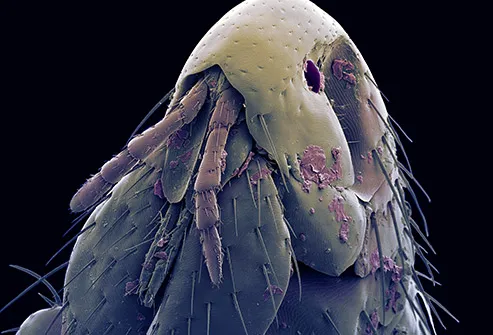
Plague
Bites from infected fleas cause bubonic and septicemic plague. But if your pet already has pneumonic plague, you could catch it from stray droplets when he sneezes. Each type causes fever and chills or headache, among other symptoms. It can be fatal if not treated with antibiotics. To help prevent it, keep your pets away from rodents and free of fleas.
Swipe to advance
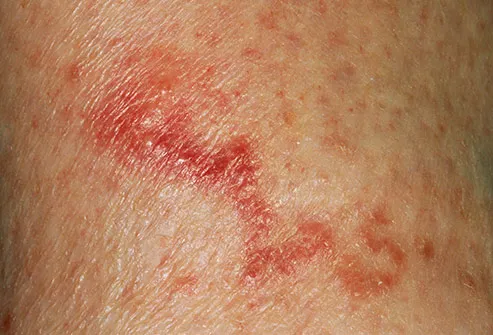
2
/
15
Hookworm
Eggs from the poop of an infected pet (often a puppy or kitten) live in the dirt and hatch into larvae. These enter your body through the skin -- if you walk on them barefoot, for example. Hookworm isn’t usually dangerous. It should go away on its own, but your feet or lower legs might be itchy with red lines for a few weeks. Let your doctor know if you notice these symptoms or if you have stomach pain or diarrhea.
Swipe to advance

3
/
15
Rabies
Infected animals transmit this virus through their spit when they bite you. It could be a raccoon, fox, skunk, coyote, or a pet that didn’t get its shots. You may feel sick and feverish at first. Later you might be nervous, confused, and unable to sleep. Wash any bite with soap and water to help protect against the virus. Get to your doctor as soon as possible. Rabies will kill you in a few days if you don’t get the right medication.
Swipe to advance

4
/
15
Toxoplasmosis
Cats that have this parasite spread it through their poop. So clean the litterbox often, and wash your hands afterward. If you’re healthy, you can get infected and not get sick from it. But it can cause problems if you’re pregnant or have a weak immune system. Symptoms include muscle aches, fever, and red, blurry eyes. Most people get better without treatment, but in serious cases, your doctor may suggest medication.
Swipe to advance
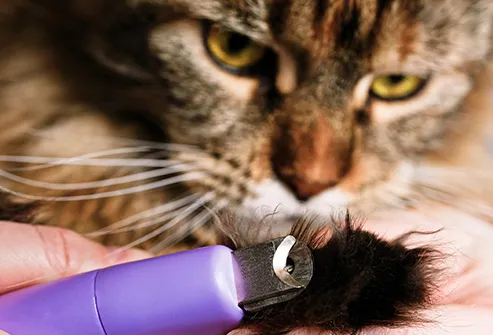
5
/
15
Cat Scratch Disease (CSD)
Your cat can give you this bacterial infection with a scratch, bite, or if she licks an open wound. The area may get tender and swollen with raised, pus-filled sores. You might have fever and a headache. It usually goes away on its own, but you could need antibiotics. To avoid scratches, trim your cat’s nails and don’t play rough. Flea treatments can prevent the bacteria that causes CSD. Wash any bites or scratches with soap and water.
Swipe to advance
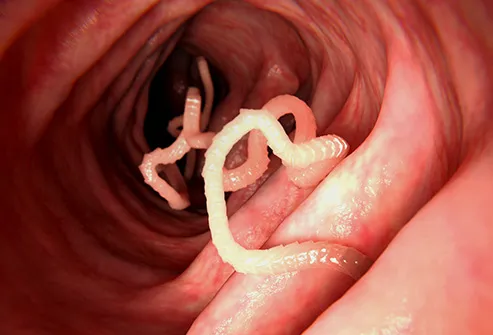
6
/
15
Tapeworm
It’s rare for people to get a tapeworm from animals, but it can happen. Typically, your pet swallows an infected flea and then you swallow a flea that bit your pet. It mostly happens to children. You may see bits of tapeworm, each piece about the size of a rice grain, in your pet’s poop. Collars and pills can help keep fleas away. Though some tapeworms are scary long -- almost 3 feet -- they aren’t usually dangerous. They’re also easy to treat.
Swipe to advance
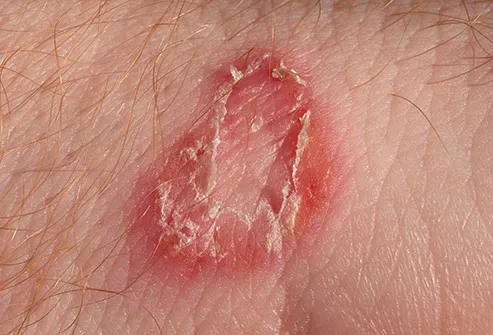
7
/
15
Ringworm
Dogs, cats, pigs, horses, and other animals can pass along this fungus when you touch them. Adult animals may not show symptoms, but kittens and puppies often have crusty hair and bald patches. People get red, itchy, ring-shaped rashes on the top layer of skin. Keep yourself, your pet, and your living area clean to help avoid the infection. Antifungal creams, sprays, and pills can get rid of it, though it sometimes returns.
Swipe to advance

8
/
15
Salmonella
Animals that carry this bacteria (lizards, snakes, birds, hamsters, goats, dogs, and cats) may look normal and healthy. But you could get sick if you don’t wash your hands after you handle their food or anything in their living area, like bedding, water containers, fencing, etc. You may have a fever, diarrhea, nausea, vomiting, and a stomachache. It usually goes away on its own in a few days, but some people might require a hospital stay.
Swipe to advance
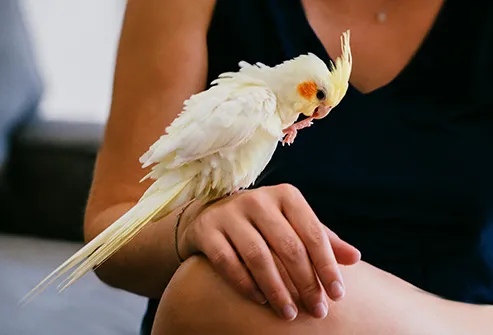
9
/
15
Psittacosis
Infected pet birds like cockatiels and parrots, or farm birds like chickens and turkeys, may have the bacteria in their pee, poop, or spit. It dries and forms small dust particles that can infect you if you breathe them in. You could also get it if a bird bites you. You might have fever, chills, headache, and a dry cough, which sometimes leads to a serious lung infection. Your doctor will give you antibiotics to kill the bacteria.
Swipe to advance
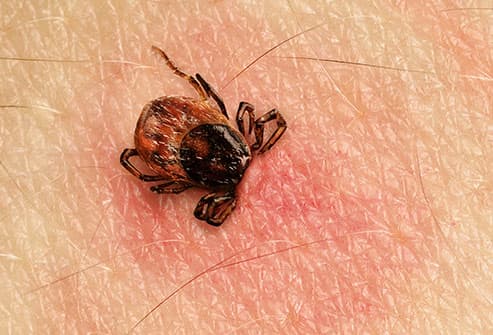
10
/
15
Lyme Disease
Cats and dogs can’t give it to you directly, but they may carry deer ticks infected with the bacteria. Collars or medications can keep ticks off your pets. It isn’t always easy to know if you have the disease. A round-shaped rash is one symptom, but not everyone gets it. You also might have a headache, joint pain, and dizziness. If you catch Lyme disease early, the right antibiotics should lead to a full recovery.
Swipe to advance

11
/
15
Rocky Mountain Spotted Fever (RMSF)
Dogs who love to run in the brush can bring home an infected tick and pass it to you. You might notice flu-like symptoms: muscle aches, chills, and fever. A rash often starts at your wrists and ankles and spreads from there. If you see this, get to your doctor within a few days and get some antibiotics. If you don’t treat it, RMSF can inflame your lungs, heart, and brain and lead to kidney failure and death.
Swipe to advance

12
/
15
Campylobacter
Infected dogs or cats spread this bacteria in poop. Symptoms, if you have them, include bloody diarrhea, nausea, stomachache, and fever. You should get better in a week or so without treatment. The doctor might give you antibiotics if you have a weak immune system or if the infection spreads to your bloodstream.
Swipe to advance
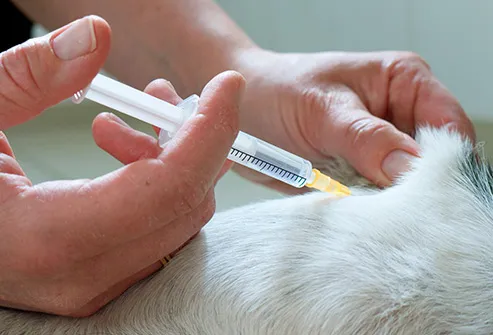
13
/
15
Giardia
This parasite travels in poop. It’s rare, but your pet can give it to you. You might have diarrhea, nausea, vomiting, or no symptoms. It usually goes away on its own, but some cases may require medicine. To keep your pets parasite-free, keep their shots up to date, protect them from fleas and ticks, bathe them often, and get rid of their waste quickly.
Swipe to advance
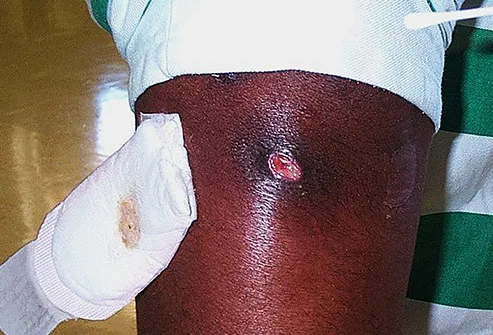
14
/
15
Methicillin-resistant Staphylococcus aureus (MRSA)
People usually get this antibiotic-resistant bacteria, but pets can get infected or become carriers. A pet can spread MRSA through a skin or wound infection. So keep things clean while you treat your pet, and keep him away from anyone who’s recently had surgery or has a weak immune system. If you get it, you’ll notice skin infections like painful, pus-filled pimples or boils. Serious cases can lead to pneumonia and blood or joint infections. Talk to your doctor or vet if you or your pet has symptoms. Treatments include wound draining and antibiotics.
Swipe to advance

15
/
15
Don’t Panic
You don’t have to worry about getting all the illnesses your pet gets. You can’t catch many of the most common ones:
- Heartworms: Parasites spread by mosquitoes that chose your pet’s heart and lungs
- Parvovirus: A virus that usually causes vomiting and diarrhea in puppies
- Distemper: A viral disease that causes fever and cough and can damage your dog’s nervous system over time
Talk to your doctor or veterinarian if you’re unsure about symptoms after you get a new pet.
Swipe to advance
- Get link
- Other Apps